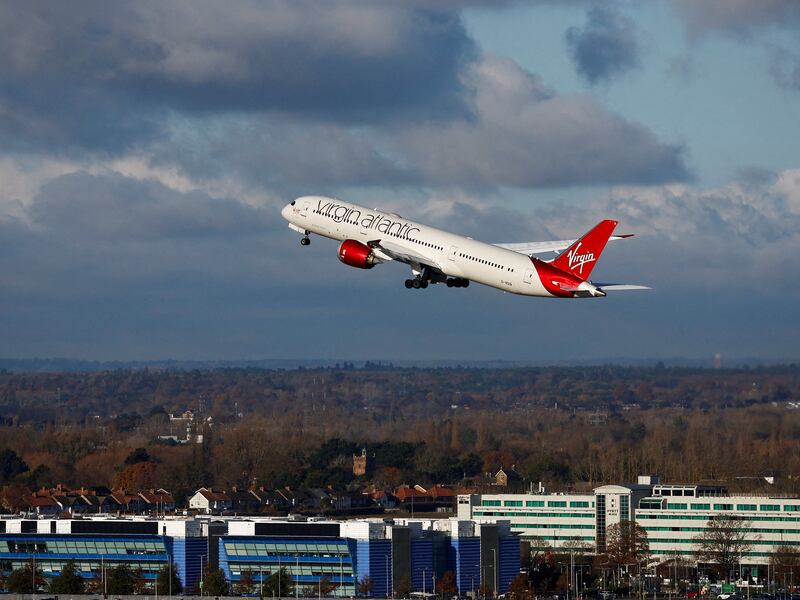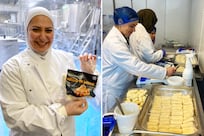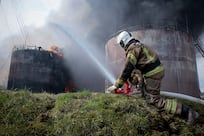A Boeing 787 Dreamliner took a step towards greener air travel on Tuesday as it took off from London to New York on sustainable fuel, an industry tipped to thrive in the Middle East.
The Virgin Atlantic plane was given special clearance by regulators to fill up with 100 per cent sustainable aviation fuel for its flight from Heathrow Airport to John F Kennedy International Airport.
Its two Rolls-Royce engines are powered by a 60-tonne blend of waste fats and synthetic kerosene – billed as having carbon emissions 70 to 80 per cent lower than standard kerosene jet fuel – reducing “travel guilt” for passengers.
Taking off on the eve of Cop28 in Dubai, the flight was described by John Kelly, Rolls-Royce president for the Middle East, Turkey and Africa, as a “symbolic event” demonstrating that the fuel is technically viable.
“It’s a historic moment and it’s a significant milestone,” he told The National.
He said the rise of sustainable fuel was especially important for markets such as the UAE that rely on long-haul travel, which is regarded as a difficult sector in which to cut carbon emissions.
“The reality is the most viable way to do that is through the use of sustainable aviation fuel,” Mr Kelly said.
Virgin founder Sir Richard Branson said he “couldn't be prouder” as he boarded the flight. “The world will always assume something can’t be done, until you do it,” he said. “The spirit of innovation is getting out there and trying to prove that we can do things better for everyone’s benefit.”
Britain's Prime Minister Rishi Sunak meanwhile joked it was an example of "blue sky thinking" as he described the flight as "very exciting".
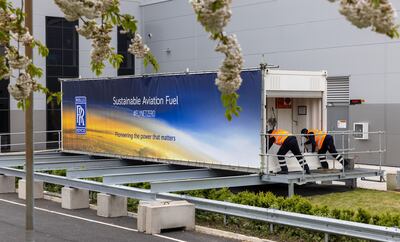
Aviation bosses like SAF because it can be “dropped in” to existing tanks without totally remodelling a plane, unlike more radical innovations such as electric or hydrogen-powered aircraft.
A UN-led aviation conference in Dubai agreed last week to aim for a 5 per cent emissions cut by 2030 through the use of sustainable fuels, days before Cop28 opens under the UAE’s leadership.
Air travel accounts for about 2 per cent of global carbon emissions. However, sustainable fuel fills up just 0.1 per cent of jet plane tanks at present, according to Virgin Atlantic, which is operating Tuesday’s transatlantic flight, known as Flight 100.
Sustainability race
US business jet manufacturer Gulfstream Aerospace, flew a SAF-powered G600 aircraft from its Georgia headquarters to an airfield in southern England on Sunday, in what it called a transatlantic first.
Emirates last week became the first airline to test 100 per cent sustainable fuel on an Airbus A380, which took off from Dubai International Airport and landed 75 minutes later. Adnoc announced last month it had been certified to produce its own blend.
Regulators normally insist on no more than a 50-50 blend of SAF and normal jet fuel, but officials in Britain gave a permit to Virgin Atlantic after testing Rolls-Royce’s Trent 1000 engine on the ground.
UK minister Baroness Charlotte Vere, Parliamentary Secretary in the Treasury, called it a “huge step towards net zero”.
Once the industry “can confidently say, technically, operationally, we're SAF-ready”, the next step is to “take down barriers” to using it more broadly, Mr Kelly said, including the cost and availability.
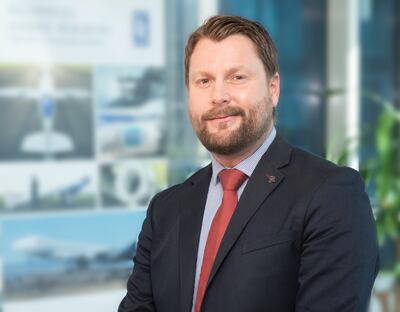
“If we do that right, it is extremely viable as a solution. You could see 80 per cent reduction in the emissions,” he said. “That’s a huge benefit and can remove the travel guilt that the travelling public may be feeling right now.”
He said “the Middle East is pivotal” in scaling up sustainable fuel because of its political drive towards sustainability. Mr Kelly cited the UAE’s presidency of Cop28 and access to finance and renewable energy.
“The leadership, the drive, the strategic direction is there,” he said.
“You’ve actually got the ability, environmentally, for potential production of SAF in large quantities, through things like harnessing renewables – solar is the obvious one in this part of the world.
“Then you’ve got the really key driving factor which is finance. You’ve got the investment through sovereign wealth funds and some of the financial entities based here in the world that will really drive the step change in what’s required with that long-term mindset.
“This isn’t done for a quick return, it’s done for the benefit of us all.”
Manufacturers such as Rolls-Royce are also looking into electric-powered planes, although the expectation is that these would be for short regional trips because of the weight of on-board batteries. Hydrogen is another option being explored, although this takes up much more space than conventional jet fuel.
A sustainable aviation forum is scheduled for day seven of Cop28 at Expo City Dubai when transport will be a focus of discussions as part of a schedule of themed days at the summit.
Cop28 is taking place from Thursday until December 12.
